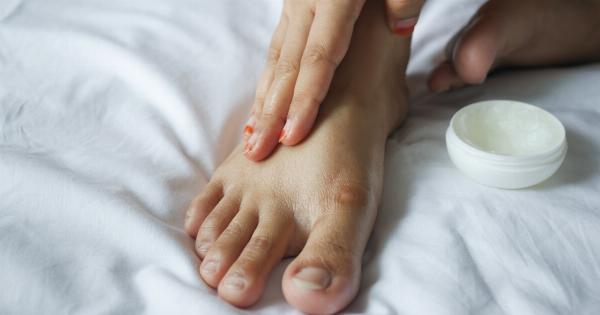Foot fungi, also known as athlete’s foot or fungal infections, can be a troublesome and uncomfortable condition affecting many individuals.
This common fungal infection typically thrives in warm and moist environments, making the feet an ideal breeding ground. Fortunately, there are several effective measures you can take to prevent and treat foot fungi. In this article, we will explore various tips, remedies, and precautions to keep your feet healthy and fungus-free.
1. Maintain Proper Foot Hygiene
Good foot hygiene plays a crucial role in preventing foot fungi. Make sure to regularly wash your feet with mild soap and lukewarm water, paying extra attention to the spaces between your toes.
Dry your feet thoroughly, especially the areas between the toes, as moisture can promote fungal growth. Avoid sharing towels or personal items that come into contact with your feet to prevent the spread of fungi.
2. Keep Your Feet Clean and Dry
Ensure that your feet stay clean and dry throughout the day. After washing, use a clean towel to dry your feet completely, removing any excess moisture. If possible, apply a talcum powder or antifungal powder to absorb perspiration and keep your feet dry.
Avoid wearing damp or sweaty socks and change them regularly, particularly after exercise or other activities that cause your feet to sweat excessively.
3. Wear Appropriate Footwear
Choosing the right footwear can significantly reduce the risk of foot fungi. Opt for shoes made from breathable materials, such as leather or mesh, as they allow better air circulation and minimize perspiration.
Avoid wearing tight-fitting or non-breathable shoes, as they can create a moist environment favorable for fungal growth. Additionally, alternate your shoes daily to allow them to dry thoroughly. Consider wearing open-toed shoes or sandals when possible to promote ventilation.
4. Use Antifungal Sprays or Powders
Antifungal sprays or powders can be effective in preventing foot fungi. Apply them to your feet and inside your shoes as directed. These products help control fungal growth, reduce odor, and keep your feet dry.
Look for over-the-counter antifungal sprays or powders containing active ingredients like clotrimazole or miconazole. If your symptoms persist or worsen, consult a healthcare professional.
5. Avoid Walking Barefoot in Public Areas
Public areas, such as swimming pools, locker rooms, and communal showers, are often breeding grounds for foot fungi. Avoid walking barefoot in these places to minimize your risk of infection.
Always wear flip-flops or waterproof sandals to provide a barrier between your feet and potentially contaminated surfaces. Additionally, try to keep your feet as dry as possible when using these public facilities.
6. Practice Regular Toe Nail Care
Proper care of your toenails is essential in preventing foot fungi. Trim your nails regularly, keeping them clean and well-maintained.
Avoid cutting them too short or irregularly, as this can lead to ingrown toenails and create an entry point for fungal infections. If you frequent nail salons, ensure that they practice proper sterilization techniques to prevent the spread of foot fungi.
7. Choose Breathable Socks
The type of socks you wear can influence the moisture levels of your feet. Opt for socks made from natural materials like cotton or bamboo, as they are more breathable and can help absorb perspiration.
Avoid synthetic materials that trap moisture and promote fungal growth. Change your socks daily and consider using antifungal socks that have been treated with special fibers or antimicrobial agents.
8. Disinfect Your Shoes
To eliminate any potential fungal spores residing in your shoes, periodically disinfect them. You can use antifungal sprays or powders specifically designed for shoe disinfection.
Alternatively, you can apply a mixture of diluted vinegar and water to wipe the inside of your shoes. Allow them to dry completely before wearing them again. Remember to sanitize your shoes after treating foot fungi to prevent re-infection.
9. Explore Natural Remedies
Several natural remedies possess antifungal properties that can complement conventional treatments. Tea tree oil, for example, has been used for decades to relieve foot fungi symptoms.
Dilute a few drops of tea tree oil with a carrier oil, and apply it to the affected areas using a cotton swab. Other natural remedies with potential antifungal properties include garlic, apple cider vinegar, and coconut oil. While natural remedies may offer relief, consult a healthcare professional before relying solely on them.
10. Seek Medical Attention if Necessary
If you suspect a fungal infection or if your symptoms persist despite home remedies and preventive measures, it is crucial to seek medical attention.
A healthcare professional can accurately diagnose the type of fungal infection and provide appropriate treatment. They may prescribe stronger antifungal medications or recommend other interventions to help resolve the issue effectively.
Conclusion
Foot fungi can be a persistent and uncomfortable condition, but by following these effective measures, you can significantly reduce your risk of infection and maintain healthy feet.
Maintain proper foot hygiene, keep your feet clean and dry, wear appropriate footwear, utilize antifungal sprays or powders, avoid walking barefoot in public areas, practice regular toenail care, choose breathable socks, disinfect your shoes, explore natural remedies, and seek medical attention if necessary. By incorporating these preventive measures into your daily routine, you can keep your feet healthy, fungus-free, and ready to take you wherever you want to go.






























